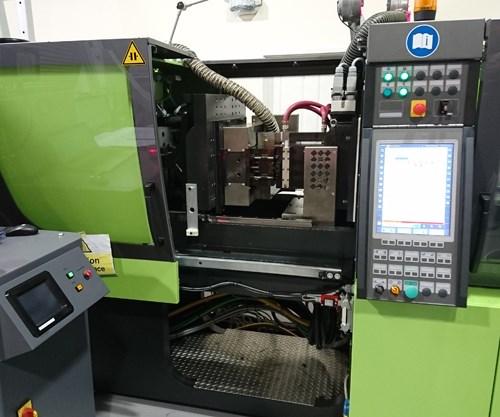Overmolding for automotive
Surface Generation (Rutland, UK) has started work on an 18-month research and development project to produce affordable, lightweight carbon fiber components for the automotive industry.
Share

Engel injection molding machine used to demonstrate Surface Generation overmolding application.
Surface Generation (Rutland, UK) has started work on an 18-month research and development project to produce affordable, lightweight carbon fiber components for the automotive industry.
Backed by Innovate UK, Surface Generation is working with project partners to create enhanced automotive components, exploiting its patented PtFS production process to overmold long fiber-reinforced carbon fiber composites with short-fiber thermoplastics. Surface Generation will develop manufacturing solutions for the production of coupons, sub-element components and demonstrator articles, designed to improve the performance of composites in automotive applications.
Part of the Thermoplastic Overmoulding for Structural Composite Automotive Applications (TOSCAA) project, the consortium is led by SGL Carbon Fibers and includes Jaguar Land Rover, Engenuity, LMAT, Nifco, The University of Nottingham and AMRC at the University of Sheffield and has attracted more than £2 million in UK Government funding for initiatives focused on making cars lighter and more fuel efficient.
The advanced manufacturing techniques developed by Surface Generation rely on its PtFS process, which uses active thermal management technologies incorporated in mold faces to adjust heating and cooling levels for each mold area and process stage in real-time.
Surface Generation says PtFS is already being used by global automotive, aerospace and consumer electronics manufacturers to improve the quality and throughput of compression and injection molding applications and will be further developed over the course of the project.
Ben Halford, chief executive at Surface Generation, says, “The benefits of lightweight carbon fiber materials have been proven in Formula 1 and high-end supercars but are often uneconomic outside niche user cases. Surface Generation’s PtFS technology will extend the capability of thermoplastic overmolding, thereby delivering the functional benefits of carbon composites to a new class of cost-sensitive automotive components.”
Related Content
-
Carbon Mobile carbon fiber powers handheld gaming platform
HyRECM technology effectively stabilizes carbon fiber’s electrical and antenna properties, enabling development of next-gen electronics, such as the Snapdragon G3x Gen 2.
-
Syensqo launches Swyft-Ply brand for electronics, smart devices
Multifunctional composites leverage traditional advanced material benefits while meeting specific industry manufacturing and performance requirements.
-
Aviation-specific battery system uses advanced composites to address electric, hybrid flight
BOLDair’s composite enclosure, compression structures and thermal runaway management enables high-performance electric energy storage.















